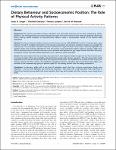Dietary Behaviour and Socioeconomic Position: The Role of Physical Activity Patterns
Finger, Jonas
Tylleskär, Thorkild
Lampert, Thomas
Mensink, Gert
Background: The positive association between education level and health outcomes can be partly explained by dietary behaviour. We investigated the associations between education and several indices of food intake and potential influencing factors, placing special emphasis on physical-activity patterns, using a representative sample of the German adult population. Methods: The German National Health Interview and Examination Survey 1998 (GNHIES98) involved 7,124 participants aged between 18 and 79. Complete information on the exposure (education) and outcome (nutrition) variables was available for 6,767 persons. The associations between ‘education’ and indices of ‘sugar-rich food’, ‘fat-rich food’, ‘fruit-and-vegetable’ and ‘alcohol’ intake were analysed separately for men and women using multivariate logistic regression analysis. Odds ratios (OR) of education level on nutrition outcomes were calculated and adjusted for age, region (former East/West Germany), occupation, income and other influencing factors such as physical activity indicators. Results: Men and women with only a primary education had a more frequent intake of sugar-rich and fat-rich foods and a less frequent intake of fruit and vegetables and alcohol than people with a tertiary education. ‘Physical work activity’ partly explained the associations between education and sugar-rich food intake. The interference with physical work activity was stronger among men than women. No significant associations between education and energy-dense food intake were observed in the retirement-age group of persons aged 65+ and among persons with low energy expenditure. Conclusions: In Germany, adults with a low level of education report that they consume energy-dense foods more frequently – and fruit and vegetables and alcohol less frequently – than adults with a high education level. High levels of physical work activity among adults with a low education level may partly explain why they consume more energy-dense foods.
No license information

